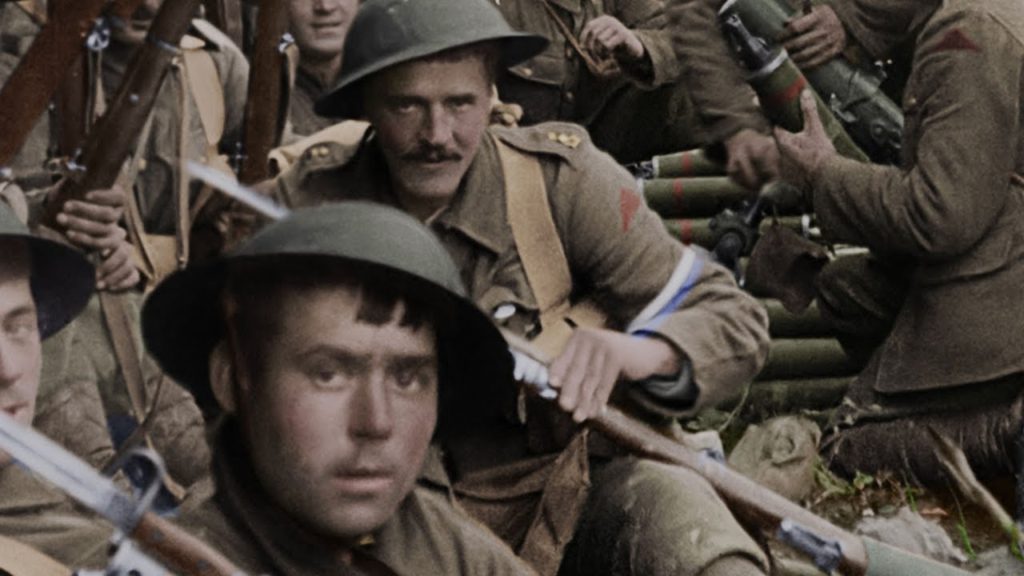
Tuesday
Last night Julia and I watched Peter Jackson’s extraordinary documentary about World War I in which he applied filmmaker’s magic to archival footage to create a sense of immediacy. By brightening dark shots and darkening overexposed ones, erasing scratches, evening out movement (World War I film was shot with hand-cranked cameras), turning long-shots into close-ups, panning photos to give new perspectives, colorizing the black and white, adding sound effects, and even reading lips to include dialogue, he created in They Shall Not Grow Old a film that looks as though it were shot yesterday.
In other words, the soldiers do not look old or like relics of a distant past. They are people like us who have been thrown into a nightmare.
To capture the day-to-day experience of those who fought in the trenches, Jackson uses for commentary the recorded reminiscences of veterans. As my own view of the war has been shaped mostly by poets and novelists like Wilfred Owen and Erich Maria Remarque, I couldn’t help but think of their own voices as I watched.
Three poems especially came to mind. First of all, I now understand better why Owen would write (in “Anthem for Doomed Youth,” “What passing-bells for these who die as cattle?” The veterans whose voices we heard in the film did not question why they were there but marched fatalistically off to slaughter. As one man reports, “We were just doing a job, if it came it came.”
I also thought of Owen’s “Greater Love” when the veterans described returning to England. Their fellow citizens could not understand what they had been through, leaving them alone in their memories. Here’s the final stanza:
Heart, you were never hot
Nor large, nor full like hearts made great with shot;
And though your hand be pale,
Paler are all which trail
Your cross through flame and hail:
Weep, you may weep, for you may touch them not.
The stanza also captures how deeply the soldiers experienced life. Living constantly in the presence of death will do that.
Finally, Thomas Hardy’s “The Man He Killed” came to mind as the veterans expressed no animosity towards the German soldiers they had fought. Although politicians may have depicted the Germans as murderous Huns, to the British soldiers they were just people following orders as they themselves were:
"Had he and I but met
By some old ancient inn,
We should have sat us down to wet
Right many a nipperkin!
“But
ranged as infantry,
And
staring face to face,
I shot at him as he at me,
And
killed him in his place.
“I
shot him dead because —
Because
he was my foe,
Just so: my foe of course he was;
That’s
clear enough; although
“He
thought he’d ‘list, perhaps,
Off-hand
like — just as I —
Was out of work — had sold his traps —
No
other reason why.
“Yes;
quaint and curious war is!
You
shoot a fellow down
You’d treat if met where any bar is,
Or help
to half-a-crown.”
The unsettling calm of Hardy’s poem captures what I heard in the veterans’ voices. They were matter-of-fact as they described the horrors. One must listen hard to hear the real feelings underneath the stiff upper-lipped “quaint and curious.”
Further thought: Tolkien fought in the trenches and one reviewer pointed to a particularly relevant passage from the Battle of Helm’s Deep in Two Towers:
“Before the wall’s foot the dead and broken were piled like shingles in a storm; ever higher rose the hideous mounds, and still the enemy came on.”

